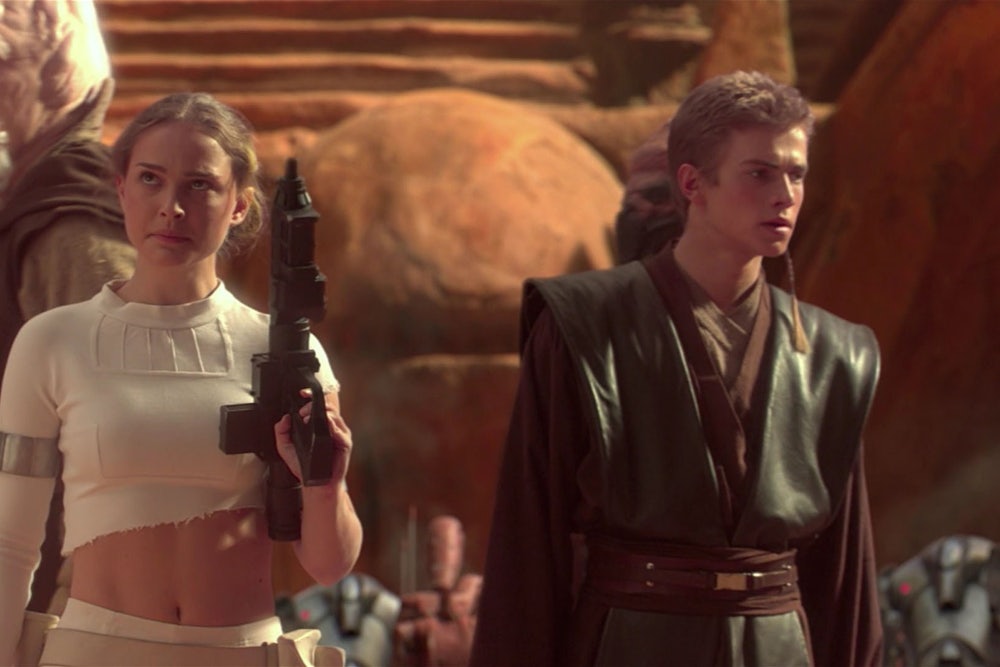The roof of the world film market must be in shreds. In the last six months three films have zoomed up through it on their opening weekends: Harry Potter and the Sorcerer’s Stone, The Lord of the Rings, and Spider-Man. Now, to ravage the roof further, comes the latest Star Wars missile, subtitled Episode II: Attack of the Clones (20th Century Fox). Where will it all end? (It probably won’t.)
Crammed though Episode II is with all kinds of combat—interplanetary conflict, shoot-outs with futuristic guns, electric assaults, duels with neon swords—what it produced in me was serenity. Little could make me feel more serene than the thought that an imaginative person is fulfilling his dreams. Can there be a happier person in our time than George Lucas, the originator and chief creator of the now five-part Star Wars series? He is the archetypal fantasizing boy made king. Steven Spielberg comes very close, but Spielberg is sometimes assailed by grave themes, and, what’s more, he deals fruitfully with them. Lucas is unencumbered by mature thought. No daydreaming kid with a bedroom full of comic books and a cellar full of gadgets ever had such a chance to realize his fantasies.
What is especially singular is that Lucas did it all on his own. The three smasheroo pictures listed above were derived from smasheroo published works: a Rowling novel, a Tolkien novel, and a comic book. Lucas is native to cinematics all the way. Educated in film, geared and lubricated by film, he revels in film. Of all these recent bonanzas, Star Wars is the only one with no subservience to a previous incarnation, with no need to transform a previous work into screen material. Star Wars was born where it lives. To think of Lucas, unbound by any inherited stricture, dreaming away busily so that he will have sufficient dreams to embody--this is a vision of one sort of paradise.
The Star Wars series has reached the point where criticism is irrelevant. The many millions around the world, young and older, frothing for this latest progeny of the Lucas brain are not in the least concerned with critical appraisal. Even the relative few who are not frothing presumably have the same uninterest in criticism, though for different reasons. A good deal of what I have read about Episode II—I even omit explanation of the numbering—is not criticism but cultural commentary, exploring what the success of the Star Wars series says about us. The New York Times ran an op-ed piece called “A Very American Movie.” This seemed to me unduly parochial. At least half the revenue from this picture, as with its predecessors, will come from abroad. To talk about the imperialism in these films, the magnifying mirror of the American geist, is to forget that these pictures are devoured everywhere. They are not, in this sense, American. They are global.
The same could also be said about those much deplored sex-and-violence American films: they are made here but are gobbled up by the world. Yet there is one huge difference between those action flicks and the Star Wars quintet. Lucas’s films have no people in them, not even to the token degree of Grade B gun-and-girlie flicks. His characters, as is now his norm, are plastic puppets, even in the confectionary love scenes. Most of their dialogue is so doughy that it could be spooned into comic-strip balloons. Lucas simply has no interest in these people. He puts invisible tags on them, winds them up, and sets them loose. He doesn’t care in the least, for instance, that some residents of the same planet speak with British accents and some do not. With a fantasizer’s aplomb, he treats the hybrids, the animal-humans that he creates, as “people.”
The reason for this disregard is central. Lucas showed in American Graffiti (1973) that he had some ability to understand the life around him, but even before that (THX 1138) and certainly afterward, he has understood something else. He is more interested in what he does when he is figuratively alone than in what the actors do, and he knows that his kind of oneiric privacy is precious to many. Thus, for him and for his audience, the people in his films are incidental, almost intrusive: the real protagonists are the imagined settings and devices. Who would care about what these people would say and do if they were transported to Earth? Lucas keeps them in a dream, a galaxy “far, far away,” because where they are is more important than who they are. The gorgeous planets and stellar highways are feasts for children who love wonder and battles and escape from parents--and for those adults who want pseudo-juvenile privacy for a few hours. Star Wars is not science worship: it is science-flavored secular sin, all the more welcome because it also purveys bite-size moralism.
Some critic, probably French, will write—possibly already has written—that Lucas is an unrecognized postmodernist. The death of character, an idea much advanced by pomo thinkers, is pretty much achieved here; and the strictures of form are bent. I hope only that this critic will also note that Lucas, for all his devout juvenility, is not without humor: the robot waitresses in a coffee shop who wheel around swiftly on unicycles, the cool bad guy who says, “I’m just a simple man, trying to make his way through the universe.”
But Lucas will not fret about anyone’s monkish analysis. He is happy, and what is more, he is free. He may be the freest person on Earth.
